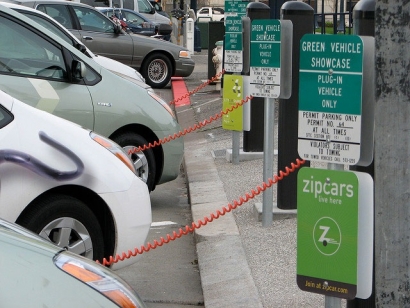
The research identified distinct profiles of people considering newer electric vehicle technologies showing the two types of vehicles — one that offers gasoline as a safety net and another that relies solely on battery charging — are very different in the eyes of consumers.
"Our findings inform the misconception and show that electric vehicles are not a homogeneous entity," said Lane, associate professor in the KU School of Public Affairs & Administration. "There are distinctive profiles of potential users for whom a plug-in hybrid is attractive and another for whom a battery electric is attractive. And these are two very distinct groups, similar to how there is a group of users who are attracted to a sport-utility vehicle and a separate group attracted to an economy car. We have shed more light on what factors influence how people make these decisions."
The journal Transportation Research Part D recently published the group's findings. Lane's co-authors are Jerome Dumortier of the School of Public and Environmental Affairs at Indiana University-Purdue University Indianapolis; Sanya Carley and John Graham, both of the School of Public and Environmental Affairs at Indiana University; Saba Siddiki of the Maxwell School of Citizenship and Public Affairs at Syracuse University and Kyle Clark-Sutton of RTI International of Research Triangle Park in North Carolina.
According to Lane, “The global stock of plug-in electric vehicles has grown from virtually zero in 2010 to more than 2 million in 2016, and in 2017, about 200,000 new plug-in electric vehicles were sold in the United States, which was a 26 percent increase over 2016 and a 72 percent increase over 2015.
"This research helps tell us how the technology has to advance in order for more of these vehicles to contribute to short-range policy goals and making them more financially viable for companies understanding how to market and sell them.”
For the study, the researchers gathered data through a 15-minute online survey administered in late 2013 among a random sample of roughly 100 adult drivers from each of the nation's 32 largest metropolitan areas. They focused on 1,080 respondents who expressed the intention to purchase or lease a new vehicle in the two years following the survey.
In addition to the distinct profiles of the two groups studied, the findings also pointed to "range anxiety" as a factor in their choice of vehicle.
Drivers who preferred the plug-in hybrid vehicles with a gasoline backup prefer the familiarity and convenience of being able to quickly refuel at a gasoline pump station at will rather than being dependent on finding an electric charging station.
"The data indicate that this group of people tends to view plug-in hybrid vehicles from a much more economically rational viewpoint," Lane said. "They register as having high household gasoline expenditures, or take longer trips, and they are reliant on their vehicles. So their interest in plug-in hybrids comes from their potential to reduce household travel expenditures with their next vehicle."
The researchers found this group of drivers seem to be more comfortable with having a vehicle with a gasoline engine as a backup.
This contrasts strongly with those who express interest in a battery electric vehicle, who are more interested in the environmental impact and image of owning such a vehicle.
"Prior experience with an alternative fueled vehicle — usually a conventional hybrid that you don't plug in – was one of the strongest predictors," Lane concluded. "The more familiarity and experience you have with any kind of alternative fueled vehicle, the more favorable your view of any kind of electric vehicle."
Photo: Plug-in hybrid vehicles charging in San Francisco in 2009.
Credit: Felix Kramer via Creative Commons on Flickr.

